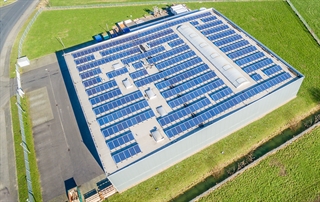
Big roofs can yield big savings: cost-effective solar strategies for manufacturing and industrial companies
Big roofs can yield big savings: cost-effective solar strategies for manufacturing and industrial companies
Authored By
Practices
 With declining solar system prices and valuable tax and other incentives, manufacturing and industrial companies—particularly ones with flat, open roofs or other large unused spaces—can potentially significantly reduce energy expenditures by offsetting a substantial portion of their electricity usage with clean, renewable energy.
With declining solar system prices and valuable tax and other incentives, manufacturing and industrial companies—particularly ones with flat, open roofs or other large unused spaces—can potentially significantly reduce energy expenditures by offsetting a substantial portion of their electricity usage with clean, renewable energy.
In addition to taking advantage of substantially lowered solar facility costs, manufacturing and industrial companies can make solar significantly more affordable by taking advantage of the 30% federal investment tax credit (ITC) and accelerated depreciation available for new solar installations. Manufacturing and industrial companies with significant tax liabilities may be able to take advantage of the ITC and depreciation directly by significantly lowering their tax payments. Even companies with limited tax liabilities may significantly benefit from the tax credit and depreciation by partnering with a tax credit investor that can utilize these valuable tax benefits.
However, companies interested in taking advantage of the ITC should be aware that the 30% tax credit is available for a limited period of time. In order to receive the full 30% ITC, the company must have commenced construction of the project by Dec. 31, 2019. Thereafter, the tax credit amount steps down on a yearly basis: 26% with construction commencing by Dec. 31, 2020; 22%, with construction commencing by Dec. 31, 2021; and 10% with construction commencing thereafter.
Moreover, many companies may be able to take advantage of property assessed clean energy (PACE) financing, which enables low-cost, long-term financing for solar projects through a special assessment on the property tax bill. PACE financing allows projects to be completed with no up-front capital costs to property owners, and the term of the financing may be able to extend to 20 years. If a company later decides to sell its business or sell the property and relocate, PACE financing can be transferred to the next property owner. Using PACE financing in combination with tax and other incentives may allow manufacturing and industrial companies to install solar with no upfront capital costs, receive significant upfront tax benefits, and substantially lower their energy costs.
Companies can potentially further reduce out-of-pocket development costs by applying for additional incentives, such as those offered by Focus on Energy, Wisconsin’s energy efficiency and renewable resource program. Focus on Energy offers eligible applicants (including businesses) the opportunity to apply for up to $400,000 per calendar year under its Renewable Energy Competitive Incentive Program. In addition, the U.S. Department of Agriculture’s Rural Energy for America Program (REAP) offers competitive grant funds for up to 25% of total eligible project costs for rural solar projects, including those developed with tax investors. To be eligible for a REAP grant, businesses must be in an “area of a State not in a city or town that has a population of more than 50,000 inhabitants,…or in the urbanized area contiguous and adjacent to a city or town that has a population of more than 50,000 inhabitants, and any area that has been determined to be ‘rural in character’ by the Under Secretary for Rural Development.”
Finally, by seeking competitive proposals, manufacturing and industrial companies may be able to lower further the net costs of installation of the solar facilities. If your company has both a large roof and energy profile, your company would likely be an attractive customer for the installer. In addition, if your company wishes to partner with a tax investor, it may be helpful to reach out to possible investors who might be involved in the installation of the project (e.g., a solar project developer) or might want to do more business with your company (e.g., a supplier).
Godfrey & Kahn has worked with numerous clients to successfully obtain competitive grant funding, partner with tax investors, and competitively bid solar projects to substantially lower project costs. For more information about renewable energy financing opportunities, please feel free to contact any member of the Godfrey & Kahn Environmental or Energy Strategies Practice Groups.


